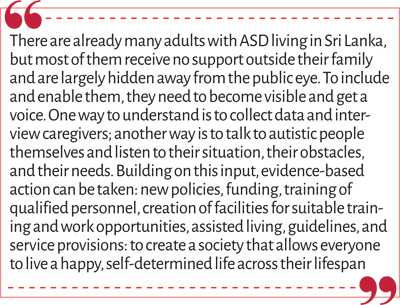Tuesday Feb 17, 2026
Tuesday Feb 17, 2026
Friday, 5 April 2019 00:00 - - {{hitsCtrl.values.hits}}
Up to 2% of the global population have Autism Spectrum Disorder (ASD). The exact number is hard to pinpoint, but millions of people are affected world-wide, tens or hundreds of thousands in Sri Lanka alone. 
Awareness of ASD is slowly rising in the country, but there is much work to be done, and critical blind spots remain. One of them is that almost every existing support for autistic people—early detection, therapy, facilities—is designed with children in mind: but it is necessary to look further and think on the scale of entire lifespans.
Autism detection and intervention during childhood
Autism is a heterogeneous disorder that manifests differently and poses different challenges for every affected person. It typically starts in early childhood and is a lifelong neurodevelopmental disorder, although early intervention can greatly improve the development of the child.
ASD is diagnosed based on behaviour that falls onto a wide spectrum. The most common symptoms of ASD are problems in social interaction, delayed or limited language development, and repetitive behavioural patterns.
Early detection and intervention for children in Sri Lanka needs to improve, as many medical practitioners are not equipped to diagnose ASD, special needs teachers are in short supply, and awareness of the issue is not nearly high enough.
The earlier therapy and other interventions are started, the better the chances to help children build their skills, overcome their difficulties, and discover their talents. The more intervention options are available, especially for poor and vulnerable households, the more children can be supported in their development toward a self-reliant and independent life.
Looking at lifespans and ASD
However, despite all this, it is important to focus not only on children with ASD. In talks with teachers, therapists, and parents, all of them express concern for the lack of infrastructure for autistic adults. When autistic children turn 18, they do not magically vanish or turn into non-autistic adults. Neither do they upon turning 30, 40, or 60.
Many of them will require lifelong assistance, and Sri Lanka lacks the necessary infrastructure and facilities. The burden of care falls on the families of autistic adults, but that is not the solution. Their parents will not be around forever. Their siblings and friends might move away or simply not be able to take care of them. And the question is:
What happens then? 
With a supportive infrastructure, people with ASD can learn trades, study in universities, work jobs, live on their own, and engage in all kinds of other activities. ASD is not a prohibitive, debilitating condition: if individual limitations and difficulties are accounted for, people on the spectrum can participate in all areas of society and contribute much.
Common symptoms of ASD include narrow interests and repetition, which can be very suitable to working in certain fields, for example the IT sector or packaging. In some countries, there are agencies that specialise in finding work for people with ASD and companies that exclusively recruit their employees from them. In October 2017, six large international corporations (including Microsoft) started the ‘Autism at Work Employer Roundtable’ to share experiences, successes, and best workplace practices: there is no reason why Sri Lankan companies could not form similar networks.
Autistic employees may require additional thought and support, but they can bring a lot to the table. It is difficult to make blanket statements, as every person with autism is different: but some teach literature, others do a PHD in music, become chefs, work as waiters, or develop software.
Inclusion and enablement of adults with ASD
Especially regarding adolescence and adulthood, there is still not enough research about ASD, for example about comorbidity (evidence suggests that adults with ASD might have an increased risk of Parkinsonism) or the transition from child to adult healthcare systems.
Sri Lanka is in dire need of support systems and infrastructure for adults with ASD. Ideally, there needs to be a lot: but how can the country bridge this divide? Much work needs to be done, and the first step has to be awareness and research.
This is not a hypothetical situation: there are already many adults with ASD living in Sri Lanka, but most of them receive no support outside their family and are largely hidden away from the public eye. To include and enable them, they need to become visible and get a voice. One way to understand is to collect data and interview caregivers; another way is to talk to autistic people themselves and listen to their situation, their obstacles, and their needs.
Building on this input, evidence-based action can be taken: new policies, funding, training of qualified personnel, creation of facilities for suitable training and work opportunities, assisted living, guidelines, and service provisions: to create a society that allows everyone to live a happy, self-determined life across their lifespan.
(Dennis Mombauer lives in Colombo as a freelance writer and researcher on special needs education and climate change. He holds a degree in Education from the University of Cologne and has worked with special needs adults in a sheltered workshop in Germany. His research is focused on autism spectrum disorder as well as on ecosystem-based adaptation and sustainable urban development. Besides articles and research, he has published numerous works of fiction in German and English.)